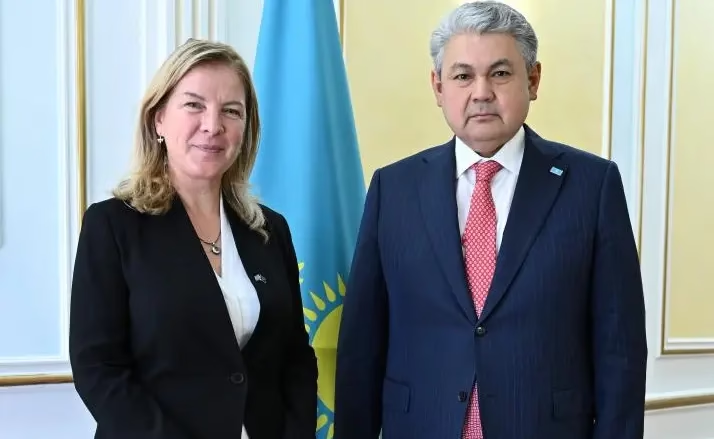Derya Soycal
Astana, Kazakhstan — As Kazakhstan celebrates its National Day on October 25, it also commemorates a milestone in its foreign policy: ten years since the signing of the Enhanced Partnership and Cooperation Agreement (EPCA) with the European Union (EU), concluded in December 2015.
The EPCA laid the foundation for an advanced legal and institutional framework, elevating EU–Kazakhstan relations to a comprehensive strategic partnership spanning 29 sectors — from trade and energy to education, environment, and digital transformation.
Over the past decade, Kazakhstan has emerged as the EU’s strongest partner in Central Asia, demonstrating its reliability and geopolitical importance through consistent cooperation and reform. For the European Union, Kazakhstan has proven to be an indispensable partner, while for Astana, ties with the EU remain a cornerstone of foreign policy.
A Growing Partnership
In June 2025, both sides reaffirmed their commitment to deepening collaboration during the 22nd meeting of the Kazakhstan–EU Cooperation Committee in Political Configuration (CCPC). The discussions, led by Luc Devigne, Managing Director for Europe and Central Asia at the European External Action Service (EEAS), and Roman Vassilenko, former Deputy Foreign Minister of Kazakhstan, focused on strengthening cooperation and evaluating the implementation of the EPCA.
According to The Astana Times, the meeting highlighted progress in multiple areas, including political dialogue, trade, and energy transition. The EU–Kazakhstan EPCA — the first such agreement signed by the EU with a Central Asian country — provides a framework for cooperation across key policy areas such as trade, investment, justice and home affairs, energy, transport, environment, climate action, employment, culture, education, and research.
Political Dialogue and Future Prospects
Minister of Foreign Affairs of the Republic of Kazakhstan Yermek Kosherbayev recently met with Head of the Delegation of the European Union to Kazakhstan, Ambassador Aleška Simkić, in Astana to mark the 10th anniversary of the strategic partnership.
During the meeting, both sides discussed prospects for further development of cooperation between Kazakhstan and the European Union, as well as ways to strengthen interregional connectivity within the “Central Asia–EU” format.
Minister Kosherbayev noted the high level of political dialogue and the sustainable dynamics of bilateral engagement, emphasizing the importance of consistent implementation of the Enhanced Partnership and Cooperation Agreement, which continues to guide EU–Kazakhstan collaboration.
Both sides exchanged views on regional and international issues, including the development of transport and logistics corridors, the green transition, digitalization, and improving Kazakhstan’s business climate.
Ambassador Simkić underscored the solid and advanced nature of Kazakhstan–EU relations, highlighting the qualitatively enhanced character of the partnership. She reaffirmed the EU’s readiness to further strengthen cooperation in the interests of Kazakhstan’s sustainable development.
Concluding the meeting, both sides reaffirmed their commitment to deepening mutually beneficial cooperation and maintaining an active political dialogue through upcoming reciprocal visits and joint events.
Economic and Trade Relations
The EU remains Kazakhstan’s largest trade and investment partner, accounting for 32.4% of its total trade, according to the EEAS. In 2024, bilateral trade reached $48.7 billion, a 16.9% increase from 2023, with exports valued at $38.1 billion and imports at $10.6 billion.
More than 3,000 European-affiliated enterprises currently operate in Kazakhstan, including Shell, TotalEnergies, Siemens, Airbus, and Schneider Electric. Since 2005, European investment has exceeded $200 billion, primarily in the energy, manufacturing, and technology sectors.
Critical Raw Materials: A Strategic Vector
A key dimension of EU–Kazakhstan cooperation lies in critical raw materials (CRM) — essential for Europe’s clean energy transition. In November 2022, European Commission President Ursula von der Leyen and Prime Minister Alikhan Smailov signed a Memorandum of Understanding on Strategic Partnerships covering sustainable raw materials, batteries, and renewable hydrogen.
President von der Leyen emphasized:
“A secure and sustainable supply of raw materials and renewable hydrogen is crucial for building a cleaner, more resilient foundation for our economies. This partnership with Kazakhstan reflects Europe’s commitment to a greener and more resilient future.”
Kazakhstan holds 33 of the 34 elements identified in the EU’s Critical Raw Materials Act, positioning it as a pivotal supplier in Europe’s efforts to diversify supply chains and reduce dependency on fossil fuels. The Sarytogan graphite deposit in Karaganda, for example, has been recognized as a strategic project by the European Commission.
Energy and Green Transition
Kazakhstan, rich in oil, gas, uranium, and metals, accounts for two-thirds of Central Asia’s GDP and supplies over 21% of the EU’s uranium demand. Major European firms, including TotalEnergies, Shell, and Eni, hold significant stakes in Kazakhstan’s energy projects — from the Kashagan and Karachaganak fields to emerging renewables initiatives.
Under the EPCA’s energy and climate chapter, Kazakhstan and the EU have strengthened cooperation through the Subcommittee on Energy, Transport, Environment and Climate Change. During the Global Gateway Forum in Brussels, Kazakhstan’s Energy Minister Yerlan Akkenzhenov reaffirmed the nation’s target of carbon neutrality by 2060, signing new agreements with the European Investment Bank (EIB) and the European Bank for Reconstruction and Development (EBRD) to finance renewable energy and infrastructure projects.
Connectivity and Transport Cooperation
Transport connectivity is another pillar of EU–Kazakhstan relations. Through the Global Gateway Initiative, the EU has pledged a €12 billion investment package to enhance infrastructure and connectivity in the region.
The Trans-Caspian International Transport Route (Middle Corridor) — linking China and Europe via Kazakhstan — is increasingly seen as a sustainable and secure overland trade route. Both sides view this corridor as a catalyst for regional development, trade diversification, and digital logistics.
Looking Ahead
Ten years after the EPCA’s signing, EU–Kazakhstan relations stand as a model of modern, strategic cooperation in Central Asia. Built on mutual trust and shared priorities — from sustainable development and energy transition to digitalization and education — this partnership continues to evolve dynamically.
As Kazakhstan and the European Union look toward the next decade, their Enhanced Partnership and Cooperation Agreement remains the cornerstone of a forward-looking, green, and interconnected Eurasian future.
SOURCE : KZA MEA & Derya Soycal | Follow Us: Facebook | Instagram | Twitter | Youtube |



